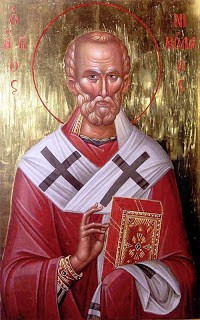Gift-giving Santa Claus has come to signify indulgence. Known also as Saint Nicholas, Father Christmas, Kris Kringle or just plain Santa, there’s more Greek to him than most people know.
In fact, Santa is a combination of ancient Greek god Dionysus and Roman Silenus, and he has come to reflect the spirit of Christmas that actually isn’t at all the date that Christ was born but a pagan holiday.
The gift-giving is absorbed from the historical 4th-century Greek bishop saint Nicholas and gift-giver of Myra in Asia Minor, a province of the Byzantine Empire that is now in Turkey. He was famous for his generous gifts to the poor, and was famous for offering three impoverished daughters of a pious Christian with dowries so that they would not have to become prostitutes.
The name Claus (Klaas) comes from the Dutch Klaas based on the Greek name Nikolas (Niklaas). Nikolas is a compound of two words – Nike (victory) and Laos (people). Essentially, it means victory to the people and represents St. Nicholas’ generosity that came to be the core of Santa.
Though many attribute the red cloak and bearded presence of Santa to a Coke campaign, the truth is that the Greek bishop St. Nicholas is traditionally seen as bearded (as are the Magi – three wise men). His costume was red though the fur linings were added later to fit the North American myth.
Interestingly enough, Greeks celebrate the coming of Agios Vassilis on New Year’s Eve.
Others are critical however of Santa Claus as a figure of consumerism and a Satanistic, paganist figure. They state that instead of focusing on the true message of Christ, people focus on Santa.
Ask me anything
Explore related questions







